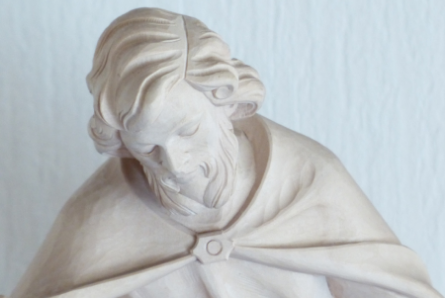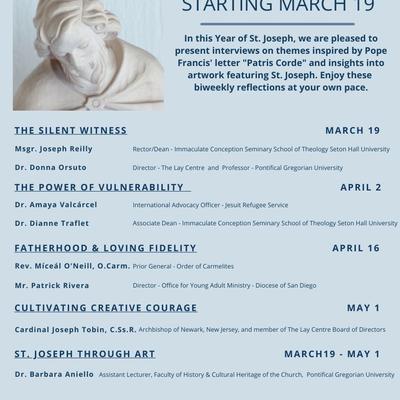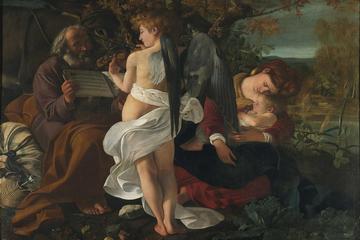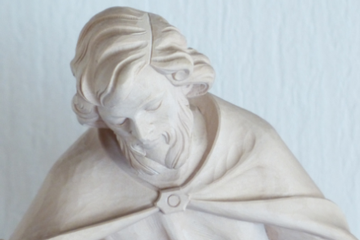
Reflections presented by Monsignor Joseph Reilly and Dr. Donna Orsuto
On this feast of St. Joseph, patron of the Church, The Lay Centre and Immaculate Conception Seminary School of Theology of Seton Hall University (ICSST) invite you to begin a journey of reflection and dialogue with Pope Francis’ apostolic letter “Patris Corde.”
This is the first in a series of brief interviews on topics to guide us in this Year of St. Joseph, instituted by Pope Francis. A silent witness, Joseph does not speak in the Gospels, but he acts in a forceful way.
“Joseph found happiness not in mere self-sacrifice but in self-gift. In him, we never see frustration but only trust. His patient silence was the prelude to concrete expressions of trust,” says the Holy Father (“Patris Corde,” 7).
We hope the accompanying insights into sacred art depicting St. Joseph, offered by Dr. Barbara Aniello, will enrich your journey. The first work of art is “The Rest on the Flight into Egypt,” by Michelangelo Merisi da Caravaggio.
We invite you to read below the responses to questions posed to Monsignor Joseph Reilly and Dr. Donna Orsuto on St. Joseph’s lack of words in the gospels, his “blind trust” in God, and the idea of Joseph as a model of the so-called “saints next door.”
Monsignor Joseph Reilly is a priest of the Archdiocese of Newark, New Jersey. He has served in parochial ministry and secondary education, and has been in seminary formation for nearly 20 years. He is the rector and dean of ICSST. He is also chair of The Lay Centre’s Board of Directors.
Dr. Donna Orsuto is the co-founder and director of The Lay Centre and a professor of spirituality at the Pontifical Gregorian University in Rome.
In Scripture, Joseph is, indeed, “silent.” He is a man of listening and action, but not of words. How do you interpret this characteristic?
Monsignor Reilly: Not a single word of St. Joseph is recorded in any of the four gospels. Joseph listens, but says nothing. His silence made him conscious of the One directing his life. While his response to God was what drove him to act, it was his silence that was his receptivity to God. “The silence of St. Joseph was not the sign of an inner void, but on the contrary, of the fullness of faith he carried in his heart, and which guided every one of his thoughts and actions” (Pope Benedict XVI).
Dr. Orsuto: It is striking how little we know about St. Joseph and yet, as Pope Francis notes, after “Mary, the Mother of God, no saint is mentioned more frequently in the papal magisterium than Joseph, her spouse.” Many saints, including St. Teresa of Avila, found in St. Joseph a faithful friend and intercessor. Churches, schools, homeless shelters, hospices and hospitals bear his name and witness to the special bond between St. Joseph and the faithful.
He utterly trusted God, as his courageous, unconditional and unspoken, “Yes,” in support of Mary demonstrates. Yet, after the finding of Jesus in the temple, suddenly and silently, he disappears from the Gospels without a trace. St. Joseph is silent, yet he speaks eloquently and abundantly through his actions, protecting, supporting and providing for Mary and Jesus.
Pope Francis often speaks of the “saints next door,” or people who live sainthood in ordinary life. What are other examples from spiritual literature or your own real-life experience?
Monsignor Reilly: True silence is about presence, about realizing that genuine life is sustained by what is hidden. “Each of us can discover in Joseph – the man who goes unnoticed, a daily, discreet and hidden presence” (“Patris Corde,” Introduction). St. André Bessette was someone who, as a porter for a high school in Montreal, humbly and quietly mediated God’s presence and healing to all those whom he encountered. Like St. Joseph, St. André embraced the lowliness, the hiddenness of his life. He never sought to rise above his station as porter.
Dr. Orsuto: Especially in this time of pandemic, all of us have discovered how “our lives are woven together and sustained by ordinary people, people often overlooked” (“Patris Corde,” 1).
Since my student days in Rome, I have been inspired by the example of Charles de Foucauld, who fully embraced the hidden life of Nazareth, and was a “saint next door” to many. His witness was recently mentioned by Pope Francis in “Fratelli Tutti.” I have often visited a small, simple and peaceful basement chapel at Tre Fontane in Rome, where the Little Sisters of Jesus have preserved some of the belongings of Little Brother Charles de Foucauld and there, I discovered his prayer of surrender to God: “I abandon myself into your hands; do with me what you will…,” which teaches us how to become "saints next door."
In silence, Joseph trusts in God. He dreams about God and then he acts. We could call this “blind trust.” Joseph listens, accepts and acts. How can he be a model of trust for us today?
Monsignor Reilly: Pope Francis writes: “Often in life, things happen whose meaning we do not understand. … The spiritual path that Joseph traces for us is not one that explains, but accepts” (“Patris Corde,”4). Trust is the foundation of every relationship, most especially our relationship with God. Joseph’s silence is the result of his deep trust in and love for God. Once again, I would like to quote Pope Benedict XVI: “God wants from us as it were a downpayment of trust. He says to us: ‘I know you don’t understand me yet. But trust me: believe me when I tell you I am good and dare to live on the basis of this trust. Then you will discover that behind your suffering, behind the difficulties of your life, a love is hiding.’”
Dr. Orsuto: The pandemic has changed our plans and the future looks uncertain. For many, its effects are dramatic: loss of loved ones, economic hardship, intense loneliness and isolation. Exactly in this time of crisis, we need to stay close to St. Joseph, who teaches us how to have an attentive ear to listen to God’s Word, in whatever surprising way it comes, and then to act courageously upon it, even without understanding completely where it is leading, no matter what the cost.
In “Patris Corde,” Pope Francis speaks of St. Joseph as someone who found happiness not in mere self-sacrifice but in “self-gift.” How do you understand this expression? How can we put this into practice in our relationships?
Monsignor Reilly: Pope Francis writes: “Joseph found happiness not in mere self-sacrifice but in self-gift. In him, we never see frustration but only trust. His patient silence was the prelude to concrete expressions of trust” (“Patris Corde,”7). One of the most inspiring gifts for me over the past nearly 20 years of working in priestly formation has been to witness a young man grow in his capacity to make a gift of himself to Christ and His Church for the service of God’s holy people. This is how Jesus loved us, by giving himself for our salvation. All of us are called to do likewise (see Jn 15:13: 'No one can have greater love than to lay down his life for his friends.').
Dr. Orsuto: Paradoxically, we can only find ourselves through a sincere gift of ourselves (see “Gaudium et Spes,” 23). We were created out of love to pour out our lives in loving service of others. St. Joseph is an example of one who understood that “it is in giving that we receive.”
The French lay woman Madeleine Delbrêl (1904-1964), another “saint next door,” dedicated her life to the poor and oppressed in the peripheries of Paris. She once wrote, “We believe with all our might that this street, this world, where God has placed us, is our place of holiness.” Madeleine, like St. Joseph, knew too that “our lives are woven together” (“Patris Corde,” 1). And she once prayed, “Lord help me to love, to be like the thread of a garment. It holds the various pieces together and no one sees it except the tailor [You Lord] who put it there.”
We start this series of reflections on the feast of St. Joseph. What can we do differently in this Year of St. Joseph to live out this time in his footsteps?
Monsignor Reilly: True to the life and example of St. Joseph, we need not look outside of the circumstances of our lives to find God’s presence and action. He shows us that it is precisely in and through the challenges of our lives that we can grow in God’s grace. Joseph seems to be telling us: “‘Do not be afraid!’ We need to set aside all anger and disappointment and to embrace the ways things are, even when they do not turn out as we wish. Not with mere resignation but with hope and courage. In this way, we become open to a deeper meaning” (“Patris Corde,” 4).
Dr. Orsuto: Let’s start by pondering those gospel passages where St. Joseph teaches us about trusting in God when all the odds seem against us, when it is hard to understand what the future holds.
Second, we can discover St. Joseph as a friend and intercessor, a faithful companion for troubled times, asking for his intercession for those in need.
Finally, let’s follow St. Joseph’s example by cultivating more silence, service and solidarity in our lives. More than ever, this is what the world needs now.



